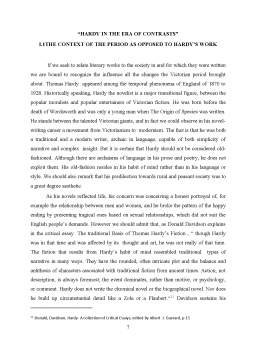Extras din proiect
“ The novel is the best equipped vehicle to present the picture of life lived in a given society against a stable background of social and moral values’’ stated David Daiches demonstrating that a novel’s creation is an act of mimesis having as purpose the reconstruction of the world and of life. As people recognize parts of their own self in it, or find parts that they were missing, the novel becomes a parallel world built page after page, word by word. That is what the Victorian public expected from novels: “an alternative reality in which they could escape into, the chance to be the witness, to pretend that literature was journalism, that fiction was history’’ They reflected, criticized and revealed life. Thus, the novel rapidly became the most popular method of presenting a certain point on social affairs, or even subjects of political matters.
The Victorian period is almost coincident in extent with the reign of Queen Victoria (1837-1901) whose name it bears. It is an age which went through many changes, greater than any had gone before, witnessing the birth of scientific knowledge, material comforts and even more importantly, intellectual and spiritual enlightenment. “Queen Victoria is also associated with the reestablishment and the rise of the royal dignity which had been compromised by her predecesors. Thanks to her the Constitutional Monarchy became a form of accepted and wanted government.”
The 19 nth century marked a turning point in many aspect of society, and as Andre Maurois states, “in no other period in the history of humanity did technological discoveries had such a great impact on the customs, ideas, and even morals as this beginning of the century. “ As a result of the scientific discoveries, the middle class ascended, soon becoming wealthier and wealthier. Many of the great bourgeois, that were part of the new industrial power came from newly rich families. This change had severe effects on England’s morality. However, we must remember that even those who lost the puritan belief still kept their austerity.
Victorian literature is also of interest it being considered “the great age of the English novel. This is partly due to the fact that together with the rise of the middle class in importance and power this form of literary art was bound to flourish, but also partly because of the increase of the reading public” . As the Act of 1870 made education compulsory, it created a reading public which required easy satisfactions, due to the fact that they were not learned readers, and had no actual educated literary tastes. Literature as a discipline only appeared at the end of the century. During that time, the manner of introduction of novels to the public were the magazine and the library, which were generally addressed to the common person. The magazine “Punch”, well known at the time “was praised for being a good reading material for women and children. With a conscious effort vices and crime have been ruled out from any literature, except for the case when they were covered in sentimentalism or humor. The monarchy, aristocracy and literature understood that in that world any excess of libertinage or sincerity would have endangered their privileges.”
One of the best known events was The Industrial Revolution which had a great impact, not only on the development of British society but also on Europe and eventually, the entire world. The introduction of coal and steam engines in the latter part of the eighteenth century made possible the development of manufacturing which made England the richest nation in the world. “ Man seemed to had became the master of nature. Steam replaced not only human labor but also that of animals and wind. In 1812 a steam boat navigated sailed along the Clyde river; in 1819 a steam ship crossed the Atlantic; in 1852 Agamemnon was lunched, the first war ship with propeller; starting from 1837 the telegraph shortened the distance between cities and continents; in 1821 Stephenson built his first locomotive and in 1830 was inaugurated the first railway from Manchester to Liverpool. The scale of the railway stations that were built amazed even the most daring spirit.”
Preview document
Conținut arhivă zip
- Hardy in a Era of Contrasts .doc











